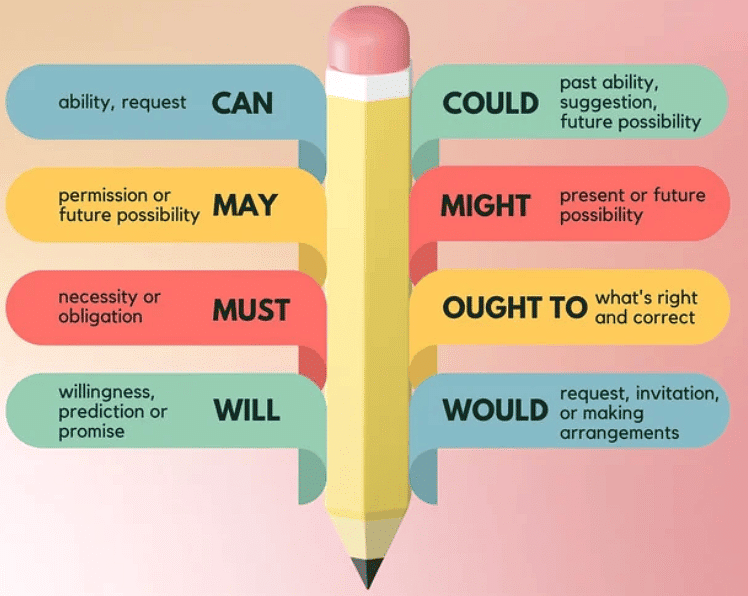Modals | English Olympiad Class 4 PDF Download
What are Modals?
Modals are special types of verbs in English that help us express ideas like possibility, ability, permission, or necessity. They are like little helpers that change the meaning of the main verb in a sentence.
Here’s a simple way to understand modals:
- Can: We use "can" to talk about what someone is able to do.
Example: I can ride a bicycle. (This means you have the ability to ride a bicycle.)
- Could: This is the past tense of "can" and can also be used to talk about something that might happen.
Example: When I was younger, I could run very fast. (This means in the past, you were able to run fast.)
Example: We could go to the park later. (This means it’s possible that you might go to the park.)
- May: We use "may" to ask for or give permission, or to talk about something that is possible.
Example: May I have some water? (You are asking for permission to drink water.)
Example: It may rain today. (This means it’s possible that it will rain.)
- Might: Similar to "may," but it shows a little less certainty.
Example: I might go to the party. (This means it’s possible, but you’re not sure.)
- Must: We use "must" to talk about something that is necessary or very important.
Example: You must do your homework. (This means it’s really important to do your homework.)
- Should: We use "should" to give advice or to say what is the right thing to do.
Example: You should eat your vegetables. (This means it’s a good idea to eat your vegetables.)
To sum it up:
- Can/Could = Ability or possibility
- May/Might = Permission or possibility
- Must = Necessity
- Should = Advice
Let's Practice and Understand more
Let's break them down into simpler terms with a few more examples to make them easier to understand.
1. Can
- Ability: Shows what someone is able to do.
Example: I can ride a bicycle. - Power: Shows who has the authority to do something.
Example: Only the Principal can allow you to leave early. - Permission: Asking or giving permission.
Example: Can I go to the bathroom? - Request: Asking someone to do something.
Example: Can you help me with this homework?
2. Could (Past form of "can")
- Possibility: Something that might happen.
Example: Anita could win the prize. - Request: A polite way to ask for something.
Example: Could you please pass the salt? - Advice: Suggesting something.
Example: You could try studying in the morning. - Condition: Showing a situation that depends on something else.
Example: If you could finish your work, you would get extra time to play.
3. May
- Request/Permission: Asking or giving permission politely.
Example: You may leave the room. - Possibility: Something that might happen.
Example: It may rain tonight. - Wish/Desire: Expressing a wish.
Example: May you have a happy birthday! - Question: Asking for information.
Example: How old may this boy be?
4. Might (Past form of "may")
- Fear/Worry: Talking about something you're worried might happen.
Example: I might lose my keys if I'm not careful.
5. Must
- Obligation: Something you have to do.
Example: You must wear your uniform to school. - Necessity: Something that is needed.
Example: You must finish your homework before you play. - Insistence: Strongly saying what you need to do.
Example: I must go to the party. - Determination: Showing strong will to do something.
Example: I must win the race.
6. Ought to
- Duty/Obligation: Something you should do because it’s right.
Example: We ought to respect our elders. - Desirability: Something that would have been good to do.
Example: You ought to have apologized for being late.
7. Have to
- Compulsion: Something you need to do.
Example: You have to finish your chores before going out.
8. Negative Forms:
- Must not: You must not run in the hallways. (It’s not allowed)
- Ought not: You ought not to speak rudely. (It’s not the right thing to do)
- Have not to: You have not to skip breakfast. (It’s not something you should do)
Simple Exercises
Fill in the blanks with the correct modal:
(i) _______ I borrow your pencil?
(Hint: Asking for permission)
Ans: Can
(ii) You _______ respect your parents.
(Hint: It’s something you should do because it’s right.)
Ans: Ought to
(iii) It _______ rain tomorrow, so take an umbrella.
(Hint: There is a possibility.)
Ans: May
(iv) I _______ complete this project by tonight.
(Hint: I am determined to do it.)
Ans: Must
(v) We _______ leave early if we want to catch the bus.
(Hint: It’s something we need to do.)
Ans: Have to
|
38 videos|68 docs|42 tests
|
FAQs on Modals - English Olympiad Class 4
| 1. What are modals in English grammar? |  |
| 2. How are modals different from regular verbs? |  |
| 3. Can modals be used to express past actions? |  |
| 4. What are some common modal verbs in English? |  |
| 5. How are modals used to make requests and suggestions? |  |





















